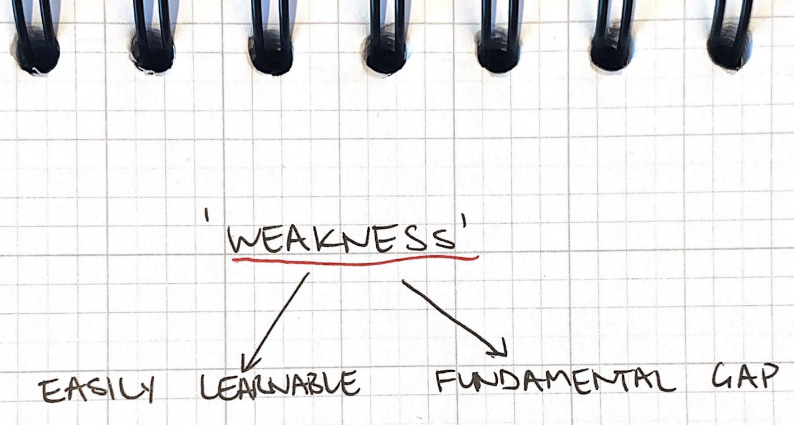Could Your Weaknesses be Your Map to Success?
Your deficiencies might actually illuminate your life’s path

I strongly advocate for playing to your strengths — but there might be another side to that coin.
Focus on your strengths too much, you’ll become one-dimensional:
A basketball player who can only shoot — no dribble moves.
An engineer who is a technical expert but can’t communicate their brilliance
A writer who can write non-fiction but has none of the creativity or imagination of a fiction writer
To take yourself to the next level, you might need to look in an unexpected place.
How to find out what to focus on
I had just met David —we were sat in a room discussing career paths.
I explained that I lacked skills in the more technical side of Engineering. I was treating it as a hole in my skillset — a negative — but he saw it as an opportunity.
David said:
“That’s what your career, and life, is all about — filling your own gaps. Getting good at your weaknesses.”
That was interesting, right. Our weaknesses are somewhat of a guide.
If you’re a great leader, but a bad speaker, it’s a better idea to improve your speaking skills rather than reading another leadership book. Becoming a great motivational speaker, and being able to rally your team together will move the needle way more than the diminishing returns you’ll receive in your already elite skill.
We focus on avoiding our weaknesses, but maybe the answer lies within them — like the radar charts in FIFA that show you your strengths:
What should Jack Grealish focus on?
He could keep training his strength, speed, stamina and agility — but him working on his balance will be the largest return on investment. His balance will allow him to recruit more of his speed anyway, as he’s probably losing some of the kinetic energy to instability.
Once his stability is improved, his agility, jumping, strength and sprint speed will all benefit.
But if Jack Grealish had doubled down on the things he was already good at, he wouldn’t improve as a player — because his weaknesses could still be exposed. A small bump would push him off the mark.
David was telling me that every step in his career has been a step to fill the gap he was missing.
He took jobs purely to boost the areas he had to improve in, rather than specialising more and more.
So yes, play to your strengths, but don’t forget to challenge yourself to be great at the things you’re lacking in too.
Using your weaknesses as a springboard
If you have chicken manure, sell fertiliser
— Chin-ning Chu
Not only can you look to improve your weaknesses, but you can also use them as a guide to show you what you should do.
In her book ‘Thick Face, Black Heart’, Chin-ning Chu says that some of our greatest actors and actresses are uncomfortable being themselves. They find solace in playing a character.
Even in your weaknesses, there are strengths.
If you can’t sit still in a chair, and would rather be outside, become a landscaper.
If you don’t like heavily complex maths and science — become a primary school teacher.
If you feel your weakness is communication, and you don’t like talking to people — find an office job where you can primarly work alone.
Labelling them as weaknesses is almost incorrect in itself. They’re just traits, with pros and cons. Leverage them.
Some of the best students I know are anxious ones. They’re scared of doing poorly so they execute efficiently with lots of time to spare.
They use their anxiety as a springboard for success.
Final discussion — weaknesses and how to use them
These two concepts do create some contradiction.
Do we strengthen the weakness — like Jack Grealish — or do we avoid it — like the actor?
I guess the answer lies in the word ‘weakness’.
if the weakness is “public speaking” → you can work on it
if the weakness is “creative thinking” → you may be more suited to an analytical line of work
But at the end of the day, it comes down to what you want.
Do you want to become more creative, or would you be happy being an accountant?
Usually, we don’t want to change a fundamental gap — it seems that it’s our natural inclination to avoid them. A painter is rarely good at mathematical analysis. But that doesn’t mean it can’t be done — and it’s not a concrete rule that you shouldn’t tackle a fundamental gap.
It’s just something to consider when you’re looking at what you want from this strangely beautiful life.
In any case, it’s time to change your mentality.
Next time your sit down to reflect on your strengths and weaknesses, don’t discard the weaknesses. Intertwine them into your analysis. How can you use your weakness to your advantage?
How do the weaknesses:
Show you the next steps toward your goal?
Illuminate the path best suited for you?
Thank you for reading.
I’m just sharing my lessons learned while building my Mental Fortress. My impenetrable and stable mind.
If you found it helpful, that’s great. I figured, why not share it with the world as I crystallise it.
If you liked it, sign up for these free emails in your inbox on Saturdays at 7:00 am AEST :)
And click the little like button to give me some feedback. If not, tell me why. And if you know someone who you think will like it - send it their way!





